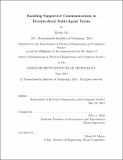| dc.contributor.advisor | Julie A. Shah. | en_US |
| dc.contributor.author | Gu, Keren, M. Eng. Massachusetts Institute of Technology | en_US |
| dc.contributor.other | Massachusetts Institute of Technology. Department of Electrical Engineering and Computer Science. | en_US |
| dc.date.accessioned | 2016-01-04T19:57:15Z | |
| dc.date.available | 2016-01-04T19:57:15Z | |
| dc.date.copyright | 2015 | en_US |
| dc.date.issued | 2015 | en_US |
| dc.identifier.uri | http://hdl.handle.net/1721.1/100597 | |
| dc.description | Thesis: M. Eng., Massachusetts Institute of Technology, Department of Electrical Engineering and Computer Science, 2015. | en_US |
| dc.description | This electronic version was submitted by the student author. The certified thesis is available in the Institute Archives and Special Collections. | en_US |
| dc.description | Cataloged from student-submitted PDF version of thesis. | en_US |
| dc.description | Includes bibliographical references (pages 33-36). | en_US |
| dc.description.abstract | Supportive communication is an eective collaboration behavior identied in human teams in which team members share information proactively to improve overall team performance. Prior work formulated this objective as the Single-Agent in a Team Decision Problem (SAT-DP) where agents decide whether or not to communicate an unexpected observation during execution time. We extend the SAT-DP denition to include sequential observations, highlighting the need for belief updates of attributed mental models of agents. These updates must be performed effectively and eciently to minimize model divergence and maximize the utility of future communications. In this paper, we present a decision-theoretic solution to the sequential SAT-DP. In our solution, we propose the use of Bayesian plan recognition as one of the methods for reducing divergence in mental models. To achieve computational tractability, we use probabilistic ordered AND/OR trees to compactly represent distributions over possible solutions of hierarchical planning problems. Finally, we evaluate and demonstrate the eectiveness of our proposed approach on decentralized agents collaborating in partially observable environments. | en_US |
| dc.description.statementofresponsibility | by Keren Gu. | en_US |
| dc.format.extent | 36 pages | en_US |
| dc.language.iso | eng | en_US |
| dc.publisher | Massachusetts Institute of Technology | en_US |
| dc.rights | M.I.T. theses are protected by copyright. They may be viewed from this source for any purpose, but reproduction or distribution in any format is prohibited without written permission. See provided URL for inquiries about permission. | en_US |
| dc.rights.uri | http://dspace.mit.edu/handle/1721.1/7582 | en_US |
| dc.subject | Electrical Engineering and Computer Science. | en_US |
| dc.title | Enabling supportive communications in decentralized multi-agent teams | en_US |
| dc.type | Thesis | en_US |
| dc.description.degree | M. Eng. | en_US |
| dc.contributor.department | Massachusetts Institute of Technology. Department of Electrical Engineering and Computer Science | |
| dc.identifier.oclc | 932129478 | en_US |
